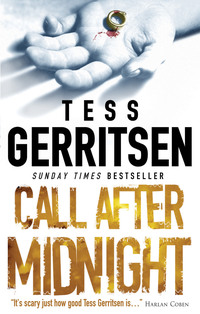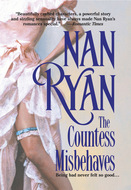Kitap dosya olarak indirilemez ancak uygulamamız üzerinden veya online olarak web sitemizden okunabilir.
Kitabı oku: «Call After Midnight»
A fan-favorite novel by internationally bestselling author Tess Gerritsen
Newlywed Sarah Fontaine has just received the news that every wife fears: her husband of two months has died abroad in a hotel fire. Yet convinced he's still alive, Sarah forges an alliance with Nick O'Hara from the U.S. State Department that has the two of them crisscrossing Europe on a desperate search for signs of life. As Sarah and Nick become quarry in the secret world of international espionage, they must risk everything for answers that may prove fatal.
Rave reviews for the novels ofTess Gerritsen
VANISH
“Gerritsen’s latest novel is a tense, taut thriller that grabs readers from the get-go and never lets up.”
—Booklist
BODY DOUBLE
“An electric series of startling twists, the revelation of ghoulishly practical motives and a nail-biting finale make this Gerritsen’s best to date.”
—Publishers Weekly
“The story zips along.… A delightfully bizarro plot twist.”
—Entertainment Weekly
THE APPRENTICE
”Well-drawn characters and a compelling story will grab readers’ interest and earn Gerritsen more admirers.”
—Booklist
“Leave the lights on, check the closets, and lock the doors before cracking [The Apprentice].”
—People
THE SURGEON
“Gliding as smoothly as a scalpel in a confident surgeon’s hand, this tale proves that Gerritsen…has morphed into a…suspense novelist whose growing popularity is keeping pace with her ever-finer writing skills.”
—Publishers Weekly
“Gerritsen fans know by now what to expect from her: a fascinating story with a gripping plot and believably human characters. Such is The Surgeon, and, in places, then some. Let new readers learn what the fans delight in.”
—Booklist
THE SINNER
“Gerritsen gives atmospheric depth to her tale… satisfyingly gritty.”
—Publishers Weekly
Call After Midnight
Tess Gerritsen

To Jacob,
who was always there
CONTENTS
Cover
Back Cover Text
Praise
Title Page
Dedication
Contents
PROLOGUE
CHAPTER ONE
CHAPTER TWO
CHAPTER THREE
CHAPTER FOUR
CHAPTER FIVE
CHAPTER SIX
CHAPTER SEVEN
CHAPTER EIGHT
CHAPTER NINE
CHAPTER TEN
CHAPTER ELEVEN
CHAPTER TWELVE
CHAPTER THIRTEEN
CHAPTER FOURTEEN
CHAPTER FIFTEEN
CHAPTER SIXTEEN
Extract
Endpage
Copyright
PROLOGUE
Berlin
IT TAKES TWENTY seconds of pressure on the carotid arteries to render a man unconscious. Two minutes longer, and death is inevitable. Simon Dance didn’t need a medical textbook to tell him these facts—he knew them from experience. He also knew there could be no slack in the garrote. If the cord wasn’t taut, if it allowed just a short spurt of precious blood to reach the victim’s brain, the struggle would be prolonged. It made the whole process sloppy, even dangerous. There was nothing as savage as a dying man.
As he crouched in the darkness, Dance wound the garrote twice around his hands and glanced at the luminous dial of his watch. Two hours had passed since he’d turned off the lights. His assassin was obviously a cautious man who wanted to be sure Dance was deeply asleep. If the man was a professional, he would know that the first two hours of sleep are the heaviest. Now was the time to strike.
In the hallway outside, a footstep creaked. Dance stiffened, then rose slowly and waited in the darkness beside the door. He ignored the pounding of his own heart. He felt the familiar spurt of adrenaline as it kicked his reflexes into high gear. He stretched the garrote between his hands.
A key was easing into the lock. Dance heard the metallic click of the teeth grating softly across metal. The key turned, and the lock opened with a soft clunk. Slowly the door swung in, and light from the hall spilled into the room. A shadow moved through the doorway and turned toward the bed, where a man appeared to be sleeping. The shadow raised its arm. Three bullets from a silencer thudded into the pillows. As the third bullet struck, so did Dance.
He whipped the garrote around the intruder’s neck and snapped the cord up and back. It tightened precisely around the most exposed portion of the carotid artery, by the angle of the jaw. The gun fell to the floor. The man thrashed as if he were a hooked fish and tore frantically at the garrote. He reached back and tried to claw Dance’s face. His arms and legs went out of control, wildly jerking and thrusting in all directions. Then gradually the legs crumpled, and the arms reached out one last time before going limp. As Dance counted the minutes, he felt the body’s last spasms, the seizures of starved and dying brain cells. He held on.
When three minutes had passed, Dance released the garrote, and the body dropped to the floor. Dance turned on the lights and gazed down at the man he’d just killed.
The mottled face was vaguely familiar. Perhaps he’d seen the man on a street or on a train somewhere, but he didn’t know his name. Quickly he went through the man’s clothes but found only money, car keys and a few tools of the trade: extra ammunition clips, a switchblade, a lock pick. A nameless professional, thought Dance, wondering offhandedly how much the man had been paid.
He dragged the body onto the bed and tossed aside the three pillows that had been fluffed up beneath the covers. He estimated the body’s size to be six feet plus or minus an inch. The same height. Good. Dance exchanged clothes with the corpse; it was probably unnecessary, but he was a thorough man. Then he took off his wedding ring and tried to slip it onto the corpse’s finger, but it wouldn’t quite fit over the knuckle. He went to the bathroom, soaped the ring and finally managed to jam it on the dead man’s finger. Then he sat down and smoked a few cigarettes. He tried to think of any details he might have missed.
The three bullets, of course. Hunting around in the pillows and ticking, Dance managed to retrieve two of the bullets. The third was probably embedded somewhere in the mattress. Before he could probe any deeper, he heard footsteps in the hallway. Did the assassin have an accomplice? Dance swept up the gun, aimed at the door and waited. The footsteps moved on and faded down the corridor. A false alarm. Still, he should leave now; to stay any longer would be foolish.
From the dresser drawer, he pulled out a bottle of methanol. It would burn rapidly and leave no residue. He poured it over the body, the bed and the surrounding rug. The room contained no smoke alarms or automatic sprinklers—Dance had chosen the old hotel for just that reason. He set the ashtray beside the bed and gathered the dead man’s belongings, along with the empty methanol bottle, and put them in a trash bag. Then he set the bed on fire.
With a whoosh the flames took off, and in seconds the body was engulfed. Dance waited just long enough to be certain there’d be nothing recognizable left.
Carrying the trash bag, he left the room, locked the door and walked down the hall to the fire alarm. He didn’t see the point of killing innocent people, so he broke the glass and pulled the alarm lever. Then he took the stairs down to the ground floor.
From an alley across the street, he watched the flames shoot from his window. The hotel was evacuated, and the street filled with sleepy-eyed people wrapped in blankets. Three fire trucks responded within ten minutes. By that time his room was a blazing inferno.
It took an hour to extinguish the fire. A crowd of curious onlookers joined the shivering hotel guests, and Dance studied their faces, filing them away in his memory. If he saw any of them again, he would be warned.
Then, through the knot of people, he spotted a black limousine crawling slowly down the street. He recognized the man sitting in the back seat. So the CIA was here. Interesting.
He had seen enough. It was late, and he needed to be on his way, back to Amsterdam.
Three blocks away, he threw the trash bag with the empty methanol bottle into a dumpster. With that the last detail was taken care of. He’d done what he had come to Berlin to do. He’d killed off Geoffrey Fontaine. Now it was time to vanish. He walked off whistling into the darkness.
* * *
Amsterdam
THE OLD MAN was awakened at three in the morning with the news. “Geoffrey Fontaine is dead.”
“How?” asked the old man.
“A hotel fire. They say he was smoking in bed.”
“An accident? Impossible! Where is the body?”
“Berlin morgue. Very badly burned.”
Of course, thought the old man. He should have known the body would not be recognizable. Simon Dance, as usual, had done a superb job of covering his tracks. So they had lost him again.
But the old man still had one card to play. “You told me there was an American wife,” he said. “Where does she live?”
“Washington.”
“I will have her followed.”
“But why? I just told you the man’s dead.”
“He’s not dead. He’s alive. I’m sure of it. And this woman may know where he is. I want her watched.”
“I’ll have my men—”
“No. I will send my own man. Someone I can count on.”
There was a pause. “I will get you her address.”
After he’d hung up, the old man could not go back to sleep. For five years he’d waited. For five years he’d been searching. To have come so close, only to fail again! Now everything depended on what this woman in Washington knew.
He had to be patient and wait for her to betray herself. He would send Kronen, a man who’d never failed him. Kronen had his own methods to extract information— methods difficult to resist. But then, that was Kronen’s special talent. Persuasion.
CHAPTER ONE
Washington
IT WAS AFTER midnight when the telephone rang.
Through a heavy curtain of sleep, Sarah heard it ring. The sound seemed impossibly far away, as if it were a distant alarm going off in a room beyond her reach. She struggled to wake up, but she was trapped somewhere in a world between sleep and wakefulness. She had to answer the phone; she knew her husband, Geoffrey, was calling.
All evening she’d waited to hear Geoffrey’s voice. It was Wednesday night, and on his monthly trips to London, Geoffrey always called home on Wednesday. Tonight, however, she’d crawled into bed early, sniffling and coughing, a victim of the latest flu virus to hit Washington. It was influenza A-63 from Hong Kong, a particularly miserable strain that she now shared with half her colleagues in the microbiology lab. For an hour she’d sat up reading in bed, fighting valiantly to stay awake. But the combination of a cold capsule plus the most recent Journal of Microbiology had worked faster than any sleeping pill. Within minutes she’d fallen back on the pillows with her glasses still perched on her nose. It would be just a short rest, she had promised herself, just a catnap…. In the end, sleep had crept up and ambushed her.
She woke with a start to find that the bedside lamp was on, Journal of Microbiology still draped across her chest. The room was slightly out of focus. Pushing her glasses back in place, Sarah glanced at the clock on the nightstand. Twelve-thirty. The telephone was dead silent. Had she been dreaming?
She jumped as the phone rang again. Eagerly she grabbed the receiver.
“Mrs. Sarah Fontaine?” asked a man’s voice.
It wasn’t Geoffrey. Sudden alarm shot through her like a jolt of electricity. Something was terribly wrong. She sat up at once, fully awake. “Yes. Speaking,” she said.
“Mrs. Fontaine, this is Nicholas O’Hara, U.S. State Department. I’m sorry to call you at this hour, but…” He paused. It was the silence that terrified her most, for it was too deliberate, too practiced, a strategically placed buffer to ready her for a blow. “I’m afraid I have some bad news,” he finished.
Her throat tightened. She felt like shouting, Just tell me! Tell me what’s happened! But all she could manage was a whisper. “Yes. I’m listening.”
“It’s about your husband, Geoffrey,” he said. “There’s been an accident.”
This isn’t real, she thought, closing her eyes. If Geoffrey were hurt, I would have felt it. Somehow I would have known....
“It happened about six hours ago,” he continued. “There was a fire in your husband’s hotel.” Another pause. Then, with concern in his voice, he asked, “Mrs. Fontaine? Are you still there?”
“Yes. Please go on.”
The man cleared his throat. “I’m sorry to tell you this, Mrs. Fontaine. Your husband…he didn’t make it.”
He allowed her a moment of silence, a moment in which she struggled to contain her grief. It was a stupid, irrational act of pride that made her press her hand over her mouth to stifle the sob. This pain was too private to share with any stranger.
“Mrs. Fontaine?” he asked gently. “Are you all right?”
At last she managed to take a shaky breath. “Yes,” she whispered.
“You don’t have to worry about the…arrangements. I’ll coordinate all the details with our consulate in Berlin. There’ll be a delay, of course, but once the German authorities clear the body’s release, there should be no—”
“Berlin?” she broke in.
“It’s in their jurisdiction, you see. There’ll be a full report as soon as the Berlin police—”
“But this isn’t possible!”
Nicholas O’Hara was struggling to be patient. “I’m sorry, Mrs. Fontaine. His identity’s been confirmed. Really, there’s no question about—”
“Geoffrey was in London,” she cried.
A long silence followed. “Mrs. Fontaine,” he said at last in an irritatingly calm voice, “the accident occurred in Berlin.”
“Then they’ve made a mistake. Geoffrey was in London. He couldn’t have been in Germany!”
Again there was a pause, longer this time. Now she could tell he was puzzled. The receiver was pressed so tightly to her ear that all she heard for a few seconds was the pounding of her heart. There had to be a mistake. Some crazy, stupid misunderstanding. Geoffrey had to be alive. She pictured him, laughing at the absurd reports of his own death. Yes, they would laugh about it together when he came home. If he came home.
“Mrs. Fontaine,” the man said at last, “which hotel was he staying at in London?”
“The—the Savoy. I have the phone number somewhere here—I have to look it up—”
“That’s all right, I’ll find it. Let me do some calling around. Perhaps I should see you in the morning.” His words were measured and cautious, spoken in the unemotional monotone of a bureaucrat who’d learned how to reveal nothing. “Can you come by my office?”
“How—how do I find it?”
“You’ll be driving?”
“No. I don’t have a car.”
“I’ll have one sent by.”
“It’s a mistake, isn’t it? I mean…you do make mistakes, don’t you?” A bit of hope, that was all she was asking him for. Some small thread to cling to. At least he could have given her that much. He could have shown her a little kindness.
But all he said was “I’ll see you in the morning, Mrs. Fontaine. Around eleven.”
“Wait, please! I’m sorry, I can’t even think. Your name—what was it again?”
“Nicholas O’Hara.”
“Where was your office?”
“Don’t worry about it,” he said. “The driver will see you get here. Good night.”
“Mr. O’Hara?”
Sarah heard the dial tone and knew that he had already hung up. She immediately dialed the number of the Savoy Hotel in London. One phone call, and the matter would be settled. Please, she prayed as the phone connection went through, let me hear your voice....
“Savoy Hotel,” answered a woman from halfway around the world.
Sarah’s hand was shaking so hard she could barely hold the receiver. “Hello. Mr. Geoffrey Fontaine’s room, please,” she blurted out.
“I’m sorry, ma’am,” the voice said. “Mr. Fontaine checked out two days ago.”
“Checked out?” she cried. “But where did he go?”
“He gave us no destination. However, if you wish to send a message, we’d be happy to forward it to his permanent address….”
She never remembered saying goodbye. She found herself staring down at the telephone as if it were something alien, something she’d never seen before. Slowly her gaze wandered to Geoffrey’s pillow. The king-sized bed seemed to stretch forever. Sarah had always curled herself into one small part of it. Even when Geoffrey was away from home and she had the bed to herself, she still never moved from her spot.
Now Geoffrey might never come home.
Sarah was left alone in a bed that was too large, in an apartment that was too quiet. She shuddered as a silent wave of pain rose and caught in her throat. She wanted desperately to cry, but the tears refused to fall.
She collapsed onto the bed with her face against the pillows. They smelled of Geoffrey. They smelled of his skin and his hair and his laughter. She clutched one of the pillows in her arms and curled up in the very center of the bed, in the spot where Geoffrey always lay. The sheets were ice-cold.
Geoffrey might never come home. They had been married only two months.
* * *
NICK O’HARA DRAINED his third cup of coffee and jerked his tie loose. After a two-week vacation wearing nothing but bathing trunks, his tie felt like a hangman’s noose. He’d been back in Washington only three days, and already he was edgy. Vacations were supposed to recharge the old batteries. That’s why he’d gone to the Bahamas. He’d spent two glorious weeks doing absolutely nothing except lie around half-naked in the sun. He’d needed the time to be alone, to ask himself some hard questions and come to some conclusions.
But the only conclusion he’d reached was that he was unhappy.
After eight years with the State Department, Nick O’Hara was fed up with his job. He was headed in circles, a ship without a rudder. His career was at a standstill, but the fault was not entirely his. Bit by bit he’d lost his patience for political games of state—he wasn’t in the mood to play. He’d hung in there, though, because he’d believed in his job, in its intrinsic worth. From peace marches in his youth to peace tables in his prime.
But ideals, he had discovered, got people nowhere. Hell, diplomacy didn’t run on ideals. It ran, like everything else, on protocol and party-line politics. While he’d perfected his protocol, he hadn’t gotten the politics quite right. It wasn’t that he couldn’t. He wouldn’t.
In that regard Nick knew he was a lousy diplomat. Unfortunately those in authority apparently agreed with him. So he had been banished to this bottom-of-the-barrel consular post in D.C., calling bad news to new widows. It was a not-so-subtle slap in the face. Sure, he could have refused the assignment. He could’ve gone back to teaching, to his comfortable old niche at American University. He had needed to think about it. Yes, he’d needed those two weeks alone in the Bahamas.
What he didn’t need was to come home to this.
With a sigh, he flipped open the file labeled Fontaine, Geoffrey H. One small item had bothered him all morning. Since 1:00 a.m. he’d been staring at a computer terminal, digging out everything he could get from the vast government files. He’d also spent half an hour on the phone with his buddy Wes Corrigan in the Berlin consulate. In frustration he’d finally turned to a few unusual sources. What had started off as a routine call to the widow to give her his regrets was turning into something a bit more complicated, a puzzle for which Nick didn’t have all the pieces.
In fact, except for the well-established details of Geoffrey Fontaine’s death, there were hardly any pieces at all to play with. Nick didn’t like incomplete puzzles. They drove him crazy. When it came to poking around for more information, more facts, he could be insatiable. But now, as he lifted the thin Fontaine file, he felt as if he were holding a bagful of air: nothing of substance but a name.
And a death.
Nick’s eyes were burning; he leaned back in his chair and yawned. When he was twenty and in college, staying up half the night used to give him a high. Now that he was thirty-eight, it only made him crotchety. And hungry. At 6:00 a.m. he’d wolfed down three doughnuts. The surge of sugar into his system, plus the coffee, had been enough to keep him going. And now he was too curious to stop. Puzzles always did that to him. He wasn’t sure he liked it.
He looked up as the door opened. His pal Tim Greenstein strode in.
“Bingo! I found it!” said Tim. He dropped a file on the desk and gave Nick one of those big, dumb grins he was so famous for. Most of the time, that grin was directed at a computer screen. Tim was a troubleshooter, the man everyone called when the data weren’t where they should be. Heavy glasses distorted his eyes, the consequence of infantile cataracts. A bushy black beard obscured much of the rest of his face, except for a pale forehead and nose.
“Told you I’d get it,” said Tim, plopping into the leather chair across from Nick. “I had my buddy at the FBI do a little fishing. He came up with zilch, so I did a little poking around on my own. Not easy, I’ll tell ya, getting this out of classified. They’ve got some new idiot up there who insists on doing his job.”
Nick frowned. “You had to get this through security?”
“Yep. There’s more, but I couldn’t access it. Found out central intelligence has a file on your man.”
Nick flipped the folder open and stared in amazement. What he saw raised more questions than ever, questions for which there seemed to be no answers. “What the hell does this mean?” he muttered.
“That’s why you couldn’t find anything about Geoffrey H. Fontaine,” said Tim. “Until a year ago, the guy didn’t exist.”
Nick’s jaw snapped up. “Can you get me more?”
“Hey, Nick, I think we’re trespassing on someone else’s turf. Those Company boys might get hot under the collar.”
“So let ’em sue me.” Nick wasn’t in the least intimidated by the CIA. Not after all the incompetent Company men he’d met. “Anyway,” he said with a shrug, “I’m just doing my job. I’ve got a grieving widow, remember?”
“But this Fontaine stuff goes pretty deep.”
“So do you, Tim.”
Tim grinned. “What is it, Nick? Turning detective?”
“No. Just curious.” He scowled at the day’s pile of work on his desk. It was all bureaucratic crap—the bane of his existence—but it had to be done. This Fontaine case was distracting him. He should just give the grieving widow a pat on the shoulder, murmur a kind word and send her out the door. Then he should forget the whole thing. Geoffrey Fontaine, whatever his real name, was dead.
But Tim had set Nick’s curiosity on fire. He glanced at his friend. “Say, how about hunting up a few things about the guy’s wife? Sarah Fontaine. That might get us somewhere.”
“Why don’t you get it yourself?”
“You’re the one with all that hot computer access.”
“Yeah, but you’ve got the woman herself.” Tim nodded toward the door. “I heard the secretary take down her name. Sarah Fontaine’s sitting in your waiting room right now.”
* * *
THE SECRETARY WAS a graying, middle-aged woman with china-blue eyes and a mouth that seemed permanently etched in two straight lines. She glanced up from her typewriter just long enough to take Sarah’s name and direct her toward a nearby couch.
Stacked neatly on a coffee table by the couch were the usual waiting room magazines, as well as a few issues of Foreign Affairs and World Press Review, to which the address labels were still attached: Dr. Nicholas O’Hara.
As the secretary turned back to her typewriter, Sarah sank into the cushions of the couch and stared dully at her hands, which were now folded in her lap. She hadn’t yet shaken the flu, and she was still cold and miserable. But in the past ten hours, a layer of numbness had built up around her, a protective shell that made sights and sounds seem distant. Even physical pain bore a strange dullness. When she’d stubbed her toe in the shower this morning, she’d felt the throb, but somehow she hadn’t cared.
Last night, after the phone call, the pain had overwhelmed her. Now she was only numb. Gazing down, she saw for the first time what a mess she’d made of getting dressed. None of her clothes quite matched. Yet on a subconscious level, she’d chosen to wear things that gave her solace: a favorite gray wool skirt, an old pullover, brown walking shoes. Life had suddenly turned frightening for Sarah; she needed to be comforted by the familiar.
The secretary’s intercom buzzed, and a voice said, “Angie? Can you send Mrs. Fontaine in?”
“Yes, Mr. O’Hara.” Angie nodded at Sarah. “You can go in now,” she said.
Sarah slipped on her glasses, rose to her feet and entered the office marked N. O’Hara. Just inside the door, she paused on the thick carpet and looked calmly at the man on the other side of the desk.
He stood before the window. The sun shone in through pencil-sketch trees, blinding her. At first she saw only the man’s silhouette. He was tall and slender, and his shoulders slouched a little—he looked tired. Moving from the window, he came around the desk to meet her. His blue shirt was wrinkled; a nondescript tie hung loosely around his neck, as if he’d been tugging at it.
“Mrs. Fontaine,” he said, “I’m Nick O’Hara.” Instantly she recognized the voice from the telephone, the same voice that had shattered her world just ten hours earlier.
He held his hand out to her, a gesture that struck Sarah as too automatic, a mere formality that he no doubt extended to all widows. But his grip was firm. As he shifted toward the window, the light fell fully on his face. She saw long, thin features, an angular jaw, a sober mouth. She judged him to be in his late thirties, perhaps older. His dark brown hair was woven with gray at the temples. Beneath the slate-colored eyes were dark circles.
He motioned her to a chair. As she sat down, she noticed for the first time that a third person was in the room, a man with glasses and a bushy black beard who was sitting quietly in a corner chair. She’d seen him when he’d passed through the reception room earlier.
Nick settled on the edge of the desk and looked at her. “I’m very sorry about your husband, Mrs. Fontaine,” he said gently. “It’s a terrible shock, I know. Most people don’t want to believe us when they get that phone call. I felt I had to meet you face-to-face. I have questions. I’m sure you have, too.” He nodded at the man with the beard. “You don’t mind Mr. Greenstein listening in, do you?”
She shrugged, wondering vaguely why Mr. Greenstein was there.
“We’re both with state,” Nick continued. “I’m with consular affairs in the foreign service. Mr. Greenstein’s with our technical support division.”
“I see.” Shivering, she pulled her sweater tighter. The chills were starting again, and her throat was sore. Why were government offices always so cold? she wondered.
“Are you all right, Mrs. Fontaine?” Nick asked.
She looked up miserably at him. “Your office is chilly.”
“Can I get you a cup of coffee?”
“No, thank you. Please, I just want to know about my husband. I still can’t believe it, Mr. O’Hara. I keep thinking something’s wrong. That there’s been a mistake.”
He nodded sympathetically. “That’s a common reaction, to think it’s all a mistake.”
“Is it?”
“Denial. Everyone goes through it. That’s what you’re feeling now.”
“But you don’t ask every widow to your office, do you? There must be something different about Geoffrey.”
“Yes,” he admitted. “There is.”
He turned and swept up a file folder from his desk. After flipping through it, he pulled out a page covered with notes. The handwriting was an illegible scrawl; it had to be his writing, she thought. No one but the writer himself would ever be able to decipher it.
“After I called you, Mrs. Fontaine, I got in touch with our consulate in Berlin. What you said last night bothered me. Enough to make me recheck the facts.” His pause made her gaze up at him expectantly. She found two steady eyes, tired and troubled, watching her. “I talked to Wes Corrigan, our consul in Berlin. Here’s what he told me.” He glanced down at his notes. “Yesterday, about 8:00 p.m. Berlin time, a man named Geoffrey Fontaine checked into Hotel Regina. He paid with a traveler’s check. The signature matched. For identification he used his passport. About four hours later, at midnight, the fire department answered a call at the hotel. Your husband’s room was in flames. By the time they got it under control, the room was totally destroyed. The official explanation was that he’d fallen asleep while smoking in bed. Your husband, I’m afraid, was burned beyond recognition.”
“Then how can they be sure it was him?” Sarah blurted. Until that instant she’d been listening with growing despair. But Nick O’Hara had just introduced too many other possibilities. “Someone could have stolen his passport,” she pointed out.
“Mrs. Fontaine, let me finish.”
“But you just said they couldn’t even identify the body.”
“Let’s try and be logical, here.”
“I am being logical!”
“You’re being emotional. Look, it’s normal for widows to clutch at straws like this, but—”
Ücretsiz ön izlemeyi tamamladınız.








